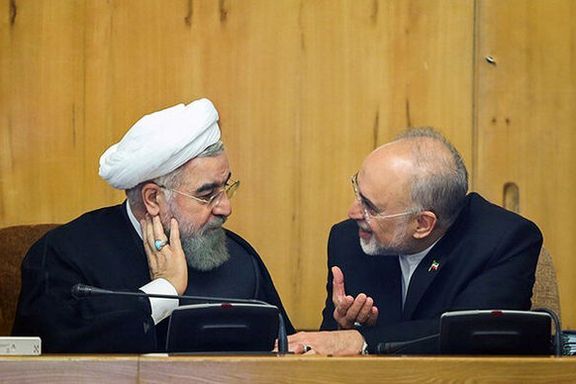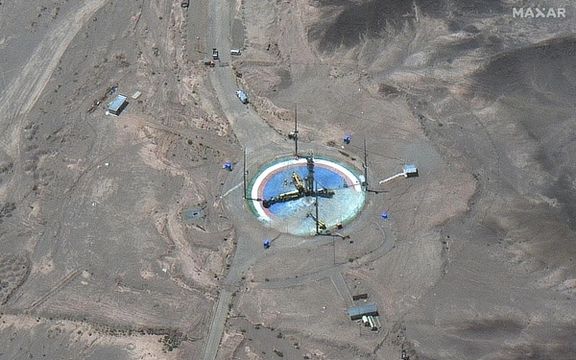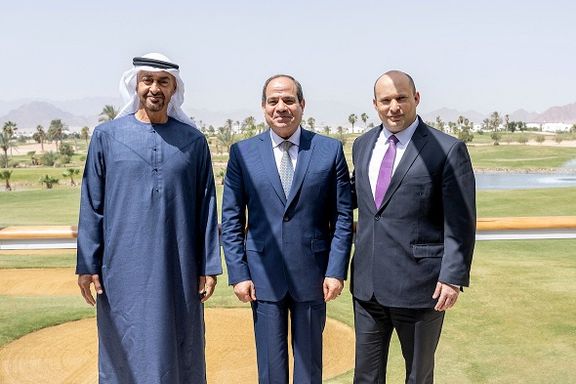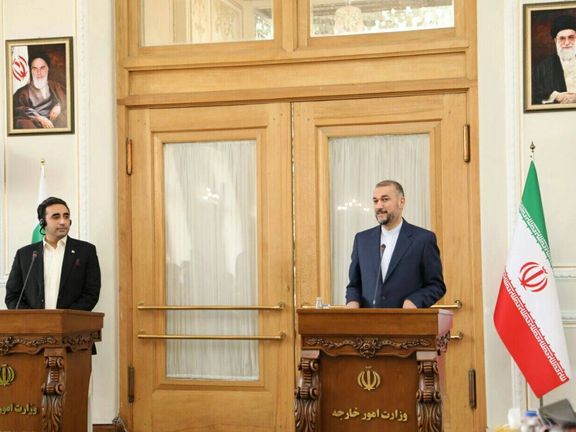Iran's Currency Rises Slightly After Dollar Injection Into Market

Iran’s currency has recuperated some of its recent losses, as the government asked exporters to share their dollar revenues with currency exchange dealers.

Iran’s currency has recuperated some of its recent losses, as the government asked exporters to share their dollar revenues with currency exchange dealers.
Iranian media reported on Tuesday that the government asked exporters, especially petrochemical companies, to sell their foreign-earned dollars directly to currency exchange dealers to stop the rials fall. This helped the Iranian currency to rise slightly, to just under 320,000 against the dollar.
But the government’s tactic has two major drawbacks. First, it seems to be an emergency measure and exporters will not agree to perpetually sell their dollars at a rate considered to be untenable on the long run. Second, the foreign currency that exporters bring back to the country is also needed by the government and the central bank, to finance needed imports and to maintain dollar reserves.
The precipitous fall of the rial has added to a sense of panic among a vast majority of Iranians who have become impoverished by persistently above-40-percent inflation for nearly two years. Anti-government protests have been taking place regularly since early May.

The Iranian parliament has accused the former president and former head of the Atomic Energy Organization (AEOI) of refusing to implement legislation for reducing Iran's JCPOA commitments.
The Article 90 Committee -- a parliamentary body mandated by the Constitution to pursue complaints concerning the work of government institutions -- presented a report on Wednesday, claiming that Hassan Rouhani and Ali Akbar Salehi deliberately ignored a December 2020 legislation entitled "Strategic Action To Eliminate Sanctions and Defend Iranian Nation's Interests.”
Touted as putting a clear legal responsibility on the government to escalate the nuclear crisis, the law was aimed at boosting uranium enrichment and restricting international nuclear inspections, if JCPOA signatories did not scrap all sanctions on Iran, including those related to human rights.
The committee said that since the refusal of these two former officials to implement the law on several occasions has been proven, the case will be "sent to the judicial authorities".
Former president Rouhani and his ministers have been threatened before with prosecution for a host of alleged mistakes and shortcomings by hardliners dominating the parliament.
The parliament passed the legislation following the assassination of nuclear scientist Mohsen Fakhrizadeh, arguing that Iran had gained nothing from the 2015 deal and even blamed it for the assassination.

After satellite photos revealed Iran’s preparations for a rocket launch, the country announced Wednesday that it plans two tests for its Zuljanah rocket.
Satellite images from Maxar Technologies showed Tuesday activity at a desert launch pad at Imam Khomeini Space Center southeast of Semnan, prompting Iranian authorities to react and acknowledge plans for tests.
The state-run IRNA news agency quoted Defense Ministry spokesman Ahmad Hosseini as confirming the tests for the new solid-fueled rocket at the site of frequent recent failed attempts to put a satellite into orbit.
He said Iran will launch its satellite-carrying Zuljanah rocket twice more after conducting a previous launch, but he did not elaborate on a timeframe for tests nor said when the previous launch occurred.
Asked about the preparations, State Department spokesman Ned Price told reporters in Washington on Tuesday that the US urges Iran to de-escalate the situation, saying that Iran “has consistently chosen to take provocative actions.”
A Pentagon spokesman, Army Maj. Rob Lodewick, said the American military “will continue to closely monitor Iran’s pursuit of viable space launch technology and how it may relate to advancements in its overall ballistic missile program.” The United States says that space launches by Iran could be a cover to develop intercontinental ballistic missiles that would be able to deliver nuclear warheads.
In March, Iran suffered another failed launch of a satellite-carrying rocket attempting to reinvigorate the program criticized by the West.

President Ebrahim Raisi appointed a caretaker for Iran's Ministry of Labor, Cooperatives and Social Welfare within minutes of resignation of Hojjat Abdolmaleki.
The pace of events led many to believe that Abdolmaleki was told to resign under pressure from the media and the parliament as weeks of protests of protests by pensioners and teachers across the country threatened political stability.
Some of the government's critics including reformist commentator Abbas Abdi wrote a June 14 tweet that "Removing Abdolmaleki from his post was a positive step by Raisi and his move should be supported."
For months, politicians, experts and many in parliament were asking Raisi to fire some of his ministers who seemed too weak to deal with a worsening economic crisis.
Like many other Raisi ministers and aides, Mohammad Hadi Zahedi Vafa the caretaker who is likely to be introduced to the parliament as the Minister of Labor is also a graduate of the ideologically notorious Imam Sadeq University and a member of ultraconservative Paydari Party. He is also close to Raisi's adviser Saeed Jalili, an unwavering Shiite ideologue.
In terms of his ideological and political loyalties Zahedi does not bring any change of direction to the ministry, beyond some tweaking with pension and salary numbers. The crux of the matter is that the government is not able to control inflation and people’s incomes have shrunk by more than 25 percent just since March.

Until Tuesday morning, Zahedi was a deputy to Vice President Mohammad Mokhber, coordinating economic supervision and infrastructure affairs. When Raisi was first introducing his ministers to parliament last September, Zahedi was Mokhber’s and Jalili's choice for the minister of economy, but Raisi appointed Ehsan Khandouzi.
He was also a candidate for the chairmanship of Iran's government owned Central Insurance Company, but again he did not get the job. At the time, Zahedi was working at the Center for the Iranian-Islamic Model for Progress. The center's mission based on an order issued by Supreme Leader Ali Khamenei is to make Iran the epicenter of Islamic civilization by 2065.
The Labor Ministry will remain under the control of Paydari Party and the Imam Sadeq Alumni gang. Zahedi, 59, studied at Imam Sadeq University in the field of Islamic Knowledge. He went to Canada in 2001 where he received a Ph.D. in economics from Ottawa University and dedicated his dissertation to Prophet Mohammed’s daughter Zahra.
Immediately after returning from Canada, he was appointed as dean of the faculties of Islamic Knowledge and Economics at Imam Sadeq University and kept the position until 2015. According to records filed at the Center for the Iranian-Islamic Model for Progress, he speaks English and Arabic.
Zahedi was a deputy minister of economy under President Ahmadinejad from 2005 to 2009 but there are no records of his activities in the government after 2009. There are references that he was an aide to Jalili at the Supreme Council of National Security and a member of the nuclear negotiating team. Meanwhile he supported Jalili in the 2013 presidential election and wrote his economic plan.
Following Abdolmaleki's resignation and Zahedi's appointment, Abdolhossein Rouholamini, a lawmaker for Tehran said that at least another two or three ministers should resign before they are fired or impeached, so that the government and the parliament could focus on dealing with the current economic crisis.

Israel intensified pressure on Iran by calling for a military front with US leadership in the Middle East ahead of a visit to the region by President Joe Biden.
Israel and Arab countries that share its worries about Iran should build up their military capabilities under Washington's aegis, the Israeli defense minister said on Tuesday.
Biden's July 13-16 tour will include Israel, the Palestinian territories and Saudi Arabia, a US official said. According to Saudi state television, Biden will attend a summit with the leaders of Gulf states, Egypt, Jordan and Iraq.
A summit of foreign ministers was held in Israel in March with the participation of the United States, United Arab Emirates, Bahrain, Morocco and Egypt. Israel highlighted the event as a show of unity against Iran.
"This new architecture -- the shared capabilities we are building -- intimidates and deters our common enemies, first and foremost Iran and its proxies," Lapid said alongside his counterparts from the other countries at the Negev summit on March 28.
Iran's nuclear program, and so-far fruitless international negotiations to revive a 2015 deal capping it, are among issues likely to be on the agenda of Biden’s visit and meetings he will held.
In a speech, Defense Minister Benny Gantz cited Israel's security ties with Gulf Arab states that drew closer to it under a 2020 U.S.-sponsored diplomatic drive, as well as Egypt and Jordan, and said there were efforts to expand such cooperation.
"In the face of Iranian belligerence ... what is needed is not just cooperation, but also a regional force build-up, with American leadership, which would strengthen all parties involved," he said, according to an official transcript.
"On this, we are working continually, for the sake of the security of Israel's citizens," Gantz said.
Saudi Arabia signaled its backing for the so-called Abraham Accords under which the United Arab Emirates and Bahrain forged relations with Israel two years ago. But Riyadh has stopped short of formally recognizing neighboring Israel.
Israel has voiced willingness to work militarily with its new Gulf partners, which have been more publicly reticent about such a prospect.
Biden’s visit to the region and specially Saudi Arabia is a major attempt to improve frayed ties with the leading Sunni Arab country in the region, with an eye to boost the kingdom’s oil production in the wake of the Russian invasion of Ukraine and the resulting high fuel prices.
Riyadh and its Arab allies who had close ties with the Trump administration, were concerned with Biden’s policy of restoring the 2015 Iran nuclear agreement and lifting sanction, without provisions to curtail Tehran’s interference in Arab countries and support for militant groups.
Speaking at an event on Tuesday evening, Bennett said Israel "will not hesitate to activate its power anywhere in the world to protect its citizens", alluding to a travel advisory to Istanbul because of what Israel said was a threat of Iranian attempts to kill or abduct vacationing Israelis.
"Israel's security arms are doing everything to thwart such attacks, and to preemptively neutralize those dispatching the terrorists, and the dispatchers’ dispatchers too," Bennett said.
With reporting by Reuters

Pakistan’s foreign minister is in Iran and has met with his Iranian counterpart as part of regular high-level exchanges between the two neighbors.
During a joint press conference on Tuesday, Bilawal Bhutto Zardari and Hossein Amir-Abdollahian said they discussed issues of mutual interest such as trade cooperation, border markets, and development of local trade. The top Pakistani diplomat arrived in Tehran for a two-day visit and is scheduled to visit Mashhad on Wednesday.
The two foreign ministers said they also talked about road and rail connectivity and tourism, as well as gas and electricity exports from Iran to Pakistan, adding that they also reviewed regional security issues with a particular focus on developments in Afghanistan and South Asia.
During the press conference, Amir-Abdollahian also touched upon the Vienna talks to restore the 2015 nuclear deal, saying that “Iran has never escaped the negotiating table and we believe that negotiation and diplomacy is the best way to reach agreement.”
The two had met on the sidelines of the World Economic Forum in Davos late in May, calling for bolstering bilateral cooperation. But relations were strained recently over Pakistani allegations of Iranian involvement with a militant separatist group. Among other issues is Islamabad’s challenge to maintain a delicate balance in ties between Iran and Saudi Arabia, whose ties have soured in recent years.